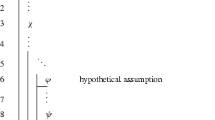Abstract
We propose a novel interpretation of natural-language questions using a modal predicate logic of knowledge. Our approach brings standard model-theoretic and proof-theoretic techniques from modal logic to bear on questions. Using the former, we show that our interpretation preserves Groenendijk and Stokhof's answerhood relation, yet allows an extensional interpretation. Using the latter, we get a sound and complete proof procedure for the logic for free. Our approach is more expressive; for example, it easily treats complex questions with operators that scope over questions. We suggest a semantic criterion that restricts what natural-language questions can express. We integrate and generalize much previous work on the semantics of questions, including Beck and Sharvit's families of subquestions, non-exhaustive questions, and multi-party conversations.
Similar content being viewed by others
References
Åqvist, L., 1965. A new Approach to the Logical Theory of Interrogatives. Uppsala: Almqvist & Wiksell.
Baltag, A., L. S., Moss, and S., Solecki, 1999, “The logic of public announcements, common knowledge and private suspicions,”. Tech. Rep. 534, Computer Science Department, Indiana University.
Beck, S. and Rullman, H., 1999, “A flexible approach to exhaustivity in questions,” Natural Language Semantics 7(3), 249–298.
Beck, S. and Sharvit, Y., 2002, “Pluralities of questions,” Journal of Semantics 19(2) 105–157.
Bos, J. and Gabsdil, M., 2000, “First-order inference and the semantics of questions and answers,” In Götalog 2000: 4th workshop on the semantic and pragmatics of dialogue, M. Poesis and D. Travan (eds.), Göteborg, Sweden: Gothemburg Papers in Computational Linguistics 00–5, pp. 43–50.
ten Cate, B., and Shan, C.-C., 2002, “Question answering: From partitions to Prolog,” In Proceedings of TABLEAUX 2002: Automated reasoning with analytic tableaux and related methods, eds. Uwe Egly and Christian G. Fermüller, 251–265. Lecture Notes in Computer Science 2381, Berlin: Springer-Verlag.
Cerrito, S., and Mayer, M. C., 2001, “Free-variable tableaux for constant-domain quantified modal logics with rigid and non-rigid designation, In Proceedings of IJCAR 2001: 1st International Joint Conference on Automated Reasoning, eds., Rajeev Goré, Alexander Leitsch, and Tobias Nipkow, 137–151. Lecture Notes in Computer Science 2083, Berlin: Springer-Verlag.
Groenendijk, J., 1999,“ The logic of interrogation: Classical version, In Proceedings from Semantics and Linguistic Theory IX, Tanya Matthews and Devon Strolovitch, (eds.), 109–126. Ithaca: Cornell University Press.
Groenendijk, J. and Stokhof, M., 1984,“ Studies on the semantics of questions and the pragmatics of answers,” Ph.D. thesis, Universiteit van Amsterdam.
Groenendijk, J. and Stokhof M., 1997, Questions. In Handbook of Logic and Language, eds., Johan van Benthem and Alice ter Meulen, 1055–1124. Amsterdam: Elsevier Science.
Hamblin, C. L. 1973, “Questions in Montague English,” Foundations of Language 10: 41–53.
Heim, I., 1994, “Interrogative semantics and Karttunen's semantics for know.,” In Proceedings of the Israeli association for theoretical linguistics.
Hintikka, J., 1976, “The semantics of questions and the questions,” of semantics. Acta Philosophies Fennica 28(4).
Karttunen, L., 1977, “Syntax and semantics of questions,” Linguistics and Philosophy 1(1) 3–44.
Monz, C., 2003, “From document retrieval to question answering. Ph.D. thesis,” Universiteit van Amsterdam.
Nelken, R. and Francez, N., 2000,“A calculus of interrogatives based on their algebraic semantics. In Proceedings of TWLT16/AMILP2000: Algebraic methods in language processing, eds., Dirk Heylen, Anton Nijholt, and Giuseppe Scollo, 143–160.
Nelken, R. and Francez, N., 2002, “Bilattices and the semantics of natural language questions,” Linguistics and Philosophy 25(1) 37–64.
van Rooy, Robert, 2003, “Questioning to resolve decision problems,” Linguistics and Philosophy 26(6) 727–763.
Sharvit, Y. and Beck, S., 2001, “Subquestions and quantificational variability effects,” In Proceedings of the 20th West Coast Conference on Formal Linguistics, (eds.), Karine Megerdoomian and Leora A. Bar-el, 510-523. Somerville, MA: Cascadilla.
Szabolcsi, A., 1997, “Quantifiers in pair-list readings,” In Ways of Scope Taking, eds., Anna Szabolcsi, chap. 9, 311–347. Dordrecht: Kluwer.
Author information
Authors and Affiliations
Corresponding author
Rights and permissions
About this article
Cite this article
Nelken, R., Shan, CC. A Modal Interpretation of the Logic of Interrogation. JoLLI 15, 251–271 (2006). https://doi.org/10.1007/s10849-005-9012-8
Received:
Accepted:
Published:
Issue Date:
DOI: https://doi.org/10.1007/s10849-005-9012-8



